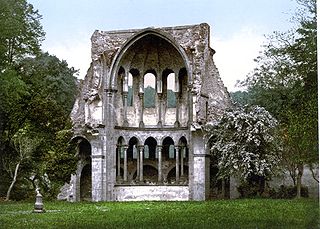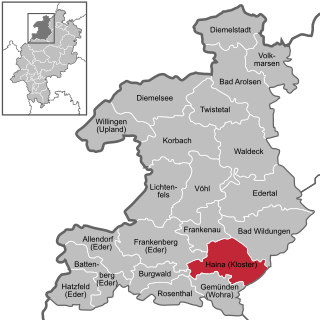Altenberg (German for "old mountain" or "mountain of the old") may refer to:
Altenberg (German for "old mountain" or "mountain of the old") may refer to:

North Rhine-Westphalia or North-Rhine/Westphalia, commonly shortened to NRW, is a state (Bundesland) in Western Germany. With more than 18 million inhabitants, it is the most populous state in Germany. Apart from the city-states, it is also the most densely populated state in Germany. Covering an area of 34,084 km2 (13,160 sq mi), it is the fourth-largest German state by size.
Berg may refer to:

The Sauerland is a rural, hilly area spreading across most of the south-eastern part of North Rhine-Westphalia, in parts heavily forested and, apart from the major valleys, sparsely inhabited.

The Bergisches Land is a low mountain range in the state of North Rhine-Westphalia, Germany, east of the Rhine and south of the Ruhr. The landscape is shaped by forests, meadows, rivers and creeks and contains over twenty artificial lakes. Wuppertal is the biggest town, while the southern part has economic and socio-cultural ties to Cologne. Wuppertal and the neighbouring cities of Remscheid and Solingen form the Bergisches Städtedreieck.
The Rheinisch-Bergische Kreis is a Kreis (district) in the Cologne Bonn Region of North Rhine-Westphalia, Germany. Neighboring districts are Kreis Mettman, Oberbergischer Kreis and Rhein-Sieg, and the district-free cities Cologne, Leverkusen, Solingen and Remscheid.

Warburg is a town in eastern North Rhine-Westphalia, central Germany on the river Diemel near the three-state point shared by Hessen, Lower Saxony and North Rhine-Westphalia. It is in Höxter district and Detmold region. Warburg is the midpoint in the Warburger Börde. Since March 2012 the city is allowed to call itself 'Hanseatic City of Warburg'.

The Duchy of Westphalia was a historic territory in the Holy Roman Empire, which existed from 1102 to 1803. It was located in the greater region of Westphalia, originally one of the three main regions in the German stem duchy of Saxony and today part of the state of North Rhine-Westphalia. The duchy was held by the archbishop-electors of Cologne until its secularization in 1803.

Heisterbach Abbey was a Cistercian monastery in the Siebengebirge near Oberdollendorf in North Rhine-Westphalia, Germany.

Haina (Kloster) is a municipality in Waldeck-Frankenberg in northwest Hesse, Germany.
Altenberg is an Ortsteil (area) in the municipality of Odenthal in the Rheinisch-Bergischer Kreis of the State of North Rhine-Westphalia, Germany, and was formerly the seat of the Counts of Berg. Over the course of time, they created around their Residence a small dominion, which later came to be called the Bergisches Land.
Schwarzbach is a German name meaning "dark stream."

Altenberg Abbey is a former Cistercian monastery in Altenberg, now a part of the municipality of Odenthal in the Bergisches Land, North Rhine-Westphalia, Germany.

The Süder Uplands, form a major natural region of the Rhenish Massif in the German states of North Rhine-Westphalia and northwestern Hesse. They correspond roughly to the historic regions of the Sauerland, Bergisches Land, Siegerland and Wittgenstein Land in NRW as well as the Upland and the extreme northwest of the Hinterland in Hesse.

Dhünn is a 40 km (25 mi)-long river located in North Rhine-Westphalia, Germany. Its main source is near Wipperfürth in the Bergisches Land area. It runs in a south-westerly direction, and its mouth into the river Wupper is near Leverkusen, appr. 10 km (6.2 mi) north of Cologne.

Witzhelden is a small town located in the district of Leichlingen near the cities of Düsseldorf, Solingen, and Cologne in the state of North Rhine-Westphalia in Germany.
Alte Burg, Alteburg or Burgstall Alte Burg refers to the name or nickname of various castles, castle ruins, castle sites and hillforts or ringworks:
Lambach is a market town in the Wels-Land district of Upper Austria.

The Altenberger Dom is the former abbey church of Altenberg Abbey which was built from 1259 in Gothic style by Cistercians. Listed as a cultural heritage, it is located in Altenberg, now part of Odenthal in the Rheinisch-Bergischer Kreis, North Rhine-Westphalia, Germany. Until 1511, the church was the burial site of counts and dukes of Berg and the dukes of Jülich-Berg.